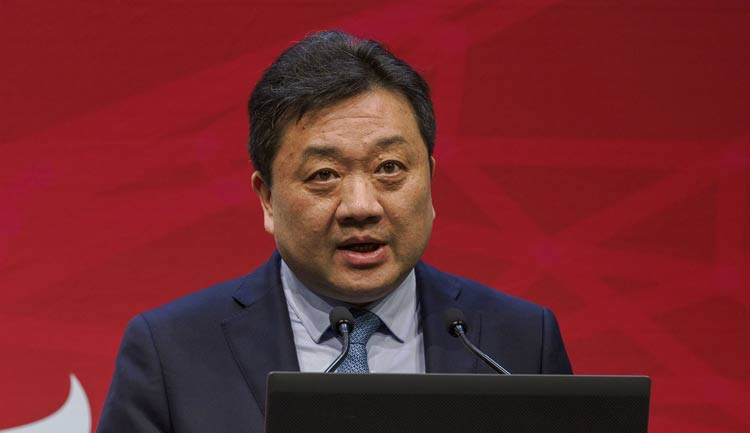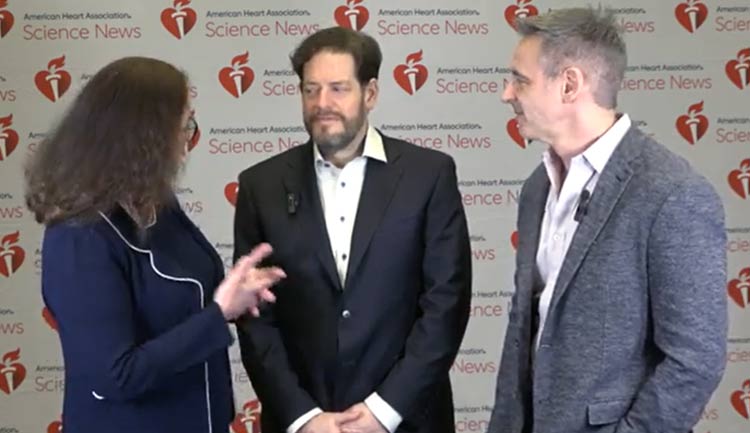Science News from #ISC24
ISC Sessions: February 7–9, 2024
Phoenix Convention Center | Phoenix, Arizona
Welcome to #ISC24
On this page you'll find in-depth interviews on some of the top science in Phoenix this year. Select a Late-Breaking presentation from the drop down list.
That's a Wrap!
Tudor Jovin, MD, FAHA, and Lauren Sansing, MD, PhD share their top picks from all the #ISC24 activities, and encourage viewers to attend the International Stroke Conference next year, February 5-7, 2025 in Los Angeles.
ZODIAC
Zero Degree Head Positioning in Acute Large Vessel Ischemic Stroke
Anne W Alexandrov | University of Tennessee Health Science Center, Memphis, TN
RESULTS: In participants with hyperacute large vessel occlusion (LVO) ischemic stroke awaiting thrombectomy, 0-degree head of bed (HOB) positioning resulted in better neurological outcomes compared to participants with 30-degree HOB positioning.
- ZODIAC Data Summary (PDF)
- ClinicalTrials ID: NCT03728738(link opens in new window)
- AHA News Release: Position of stroke patient’s head before surgery may improve neurological function
- Video:(link opens in new window) ZODIAC Commentary with Peter Panagos, MD, FAHA (new window)(link opens in new window)
RESILIENT-Extend
Randomization of Endovascular Treatment with Stent-retriever and/or Thromboaspiration vs. Best Medical Therapy in Acute Ischemic Stroke due to Large VEssel OcclusioN Trial in the Extended Time Window
Raul G Nogueira, University of Pittsburgh, Pittsburgh, PA
RESULTS: Patients who underwent mechanical thrombectomy (MT) within 8-24h from the time last seen well and were selected solely based on a non-contrast tomography angiography/CT angiography, showed significantly higher rates of good (modified Rankin Score 0-2) and excellent (mRS 0-1) outcomes at 90 days, suggesting that expanding availability of MT worldwide could benefit more patients.
MOST
Multi-Arm Optimization of Stroke Thrombolysis Trial
Opeolu M Adeoye, Washington Univ, Saint Louis, MO
RESULTS: In participants with acute ischemic stroke (AIS), the use of argatroban or eptifibatide and thrombolysis did not improve functional outcomes at 90 days but did not significantly increase symptomatic intracerebral hemorrhage compared to participants who received placebo and thrombolysis within three hours of symptom onset.
#ISC24 Presidential Address
Joseph C. Wu, MD, PhD, FAHA, President of the American Heart Association, delivered the annual address to ISC24 attendees during the Opening Main Event on Wednesday, February 7, 2024. His address touched on the future of cardiovascular science and medicine.
GOLDEN BRIDGE II
Effect of an Artificial Intelligence-Based Clinical Decision Support System on Stroke Care Quality and Outcomes in Patients With Acute Ischemic Stroke (Golden Bridge II): A Cluster-Randomized Clinical Trial
Zixiao Li, Beijing Tiantan Hospital, Capital Medical University, Beijing, China
RESULTS: In participants with acute ischemic stroke, compared to usual care, AI-CDSS (artificial intelligence-based clinical decision support system) demonstrated significantly fewer vascular events at 3 months and led to improvement in stroke care quality.
EMBOLISE
Embolization of the Middle Meningeal Artery With Onyx Liquid Embolic System in the Treatment of Subacute and Chronic Subdural Hematoma
Jason Davies, University at Buffalo, Buffalo, NY
RESULTS: In participants with symptomatic subacute or chronic subdural hematoma (SDH), the addition of middle meningeal artery (MMA) embolization with Onyx™ resulted in nearly a 3-fold reduction in hematoma recurrence/progression requiring re-operation compared to surgery alone.
MAGIC-MT
Managing Non-Acute Subdural Hematoma Using Liquid Materials: A Chinese Randomized Trial of Middle Meningeal Artery Treatment
Ying Mao, Huashan Hospital, Fudan University, Shanghai, China
RESULTS: In participants with symptomatic non-acute subdural hematoma (SDH), the use of middle meningeal artery (MMA) embolization resulted in less hematoma recurrence and progression compared to standard care alone.

STEM
The SQUID Trial for the Embolization of the MMA for the treatment of CSDH
Adam S Arthur, Semmes-Murphey Neurological Clinic, Memphis, TN
RESULTS: In participants with symptomatic chronic subdural hematoma (CSDH), the addition of middle meningeal artery embolization (MMAE) with SQUID™ resulted in reduced treatment failure rate compared to standard management alone.

Published Thursday in Stroke
Association Between Hematoma Volume and Risk of Subsequent Ischemic Stroke: A MISTIE III and ATACH-2 Analysis
William Harris, et al.
Transcarotid Arterial Revascularization of Symptomatic Carotid Disease: A Systematic Review and Study-Level Meta-Analysis
Malik Ghannam, et al.
Transcarotid artery revascularization expanding our arsenal for the management of symptomatic carotid artery stenosis
Lina Palaiodimou
The effect of Remote Ischemic Condition in ischemic stroke subtypes: a subgroup analysis from the RESIST trial
Rolf Ankerlund Blauenfeldt, et al.
Radial versus Femoral Access for Mechanical Thrombectomy in Patients With Large Vessel Occlusion: A Randomized Clinical Trial
David Hernandez, et al.
Association Between Infertility Treatment With Assisted Reproductive Technology and Stroke in the United States
Alis J. Dicpinigaitis, et al.
Microglial TLR4 mediates white matter injury in a combined model of diesel exhaust exposure and cerebral hypoperfusion
Kristina Shkirkova, et al.
Important Links
Abstracts and Simultaneous Publications
Late-Breaking Science (published upon presentation)
- Opening Main Event abstracts
- Thursday Main Event abstracts
- Closing Main Event abstracts
- Late Breaking Science oral abstracts I
- Late Breaking Science oral abstracts II
- Late Breaking Science oral abstracts III
- Late Breaking Science oral abstracts IV
- Late Breaking Science oral abstracts V
Programming
- Online Program Planner (new window) - best for desktop
- Get the Mobile Meeting Guide app- best for mobile devices
- In-Person Schedule-at-a-Glance (PDF)
- State of the Science Stroke Nursing Symposium
- Other Pre-Conference Symposia - HEADS-UP, Stroke in the Real World, Stroke in the Lab World
- For Presenters and Moderators - links, templates, guidelines
Virtual Attendees
Science News
- ISC 2024 Science News page
- Science News YouTube Channel(link opens in new window)(link opens in new window)
After the conference